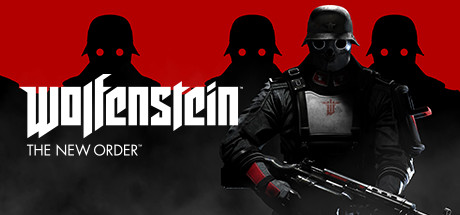
Wolfenstein: The New Order is a game that comes to us from Machine Games. I've never heard of them, frankly, but that's okay. Wolfenstein: The New Order is a fantastic game, nevertheless. The franchise has a very near to my heart, even though I haven't played a Wolfenstein game since Wolfenstein 3D. I can't really say that this game keeps to the formula of a Wolfenstein game, but that doesn't matter because I love this game.
The gameplay and controls of Wolfenstein: The New Order are fast, responsive, and a lot of fun. This game is a shoot 'em up, through and through, and the only things to shoot are Nazis. There is something oddly patriotic about killing Nazis. Though, the game makes it feel more important, given the game's storyline.
The story goes, that the Allied Nations are making one final push on the base of General Deathshed. It's all or nothing. If the Allies lose this fight, they lose the entire war. Well, long story short, they lose, BJ Blaskowicz is in a coma for fourteen years, and it's the year 1960. The Nazis won, and rule the world with an iron fist. Thanks to General Deathshed and his crazy inventions, the Nazis have technology well beyond any other country, and they steamrolled over any defiance. It's up to BJ Blaskowicz to unite the resistance and fight back against the Third Reich.

One thing that I really appreciate about the game is its pacing. Wolfenstein allows players to use stealth in some places, and to go loud in others. Choosing stealth over force, can yield some pretty nice results. If players are found out while officers are still around, the alarm will sound and reinforcements will pour in, making matters a lot more difficult than they need to be. This also plays into the overall theme of the game. Because the resistance against the Nazi regime is small, there's a lot of sneaking around before ol' BJ can really take it to the Nazis. Once the wheels start rolling, it' loud and proud for the forces of freedom.
Wolfenstein: The New Order is much more than about killing Nazis, it's about fighting against what the Nazis represent. There are many different scenes of BJ Blazkowicz being in shock over how much things had changed. The cast of characters that represent different aspects over how the times had changed give the player, and BJ, some perspective on how things are. One of the characters: J, who may or may not be there depending on a critical choice made by the player early on in the game, is one of my favorites. J is supposed to be guitar legend Jimmy Hendrix, but I'm sure that Machine Games will neither confirm or deny if that is the truth. His purpose is somewhat questionable, as the rest of the crew at the resistance home base are all working on the next step to fight back against the Nazis while J strums on his electric guitar. Because of this, I spent a lot of time with the character, trying to figure out where he fits in. J turned out to be a critical part of the operation, because of what he represented. J was the only black member of the resistance, and the only artist. His perspective as a minority shook the world of BJ Blazkowicz who had very strong beliefs on the ways things should be. J calls out BJ for being the Nazi, before the Nazis. J tells BJ of how he was oppressed simply for the color of his skin. BJ makes a good friend, and so do the players.

At the end of the game, without attempting to give away too many spoilers, BJ Blazkowicz gives a monologue describing Lady Liberty while the camera focuses on the character Anya, who is of Polish descent. This to me, represents an idea that transcends nations. In the scene, Anya is holding a lamp, and lighting the way for refugees escaping the compound. It was just a powerful scene that struck me in a way that I wouldn't have expected a game with such violence and gusto to provide.

Which brings me to the one thing that I had a problem with Wofenstein: The New Order. While the game had great gameplay, and allowed for different playstyles with running and gunning vs. sneaking around and getting those stealth kills, the game is violent. Like, really violent. Exposed internal organs after enemies taking grenades, dismemberment from being shot in arm or leg, a scene where the players watch a man get his brain extracted while they are still alive. I think that violence can help to serve the tone of the game, but this didn't quite fit. This kind of violence was supposed to serve that of a pandering nature. There are plenty of old school shooters, that went the extra violent route, simply for the sake of being controversial (or so it seemed at the time). This kind of violence is almost comical, while at the same time being quite gruesome. If there was one reason I would tell people to stay away from this game, the excessive violence would be it.
All in all, Wolfenstein: The New Order is really a fantastic game, and it fills that need for a good shooter with a good story. Call of Duty and Battlefield have their mechanics on lockdown, but are lacking in other elements. Wolfenstein: The New Order has solid gameplay mechanics, a good story with a healthy cast of colorful and memorable characters, an incredible tone, and imaginative and memorable level design. This game isn't just a shooting gallery of Nazis, but a game that makes you have to think about approaching certain enemies. Wolfenstein: The New Order is a great game, that everybody should experience.
A+